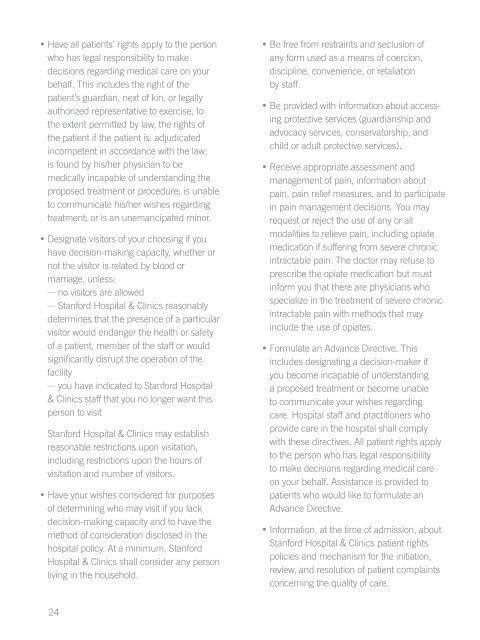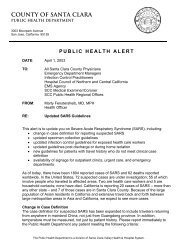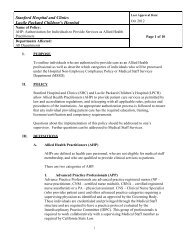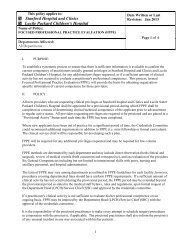Stanford Hospital & Clinics Patient Handbook
Stanford Hospital & Clinics Patient Handbook
Stanford Hospital & Clinics Patient Handbook
Create successful ePaper yourself
Turn your PDF publications into a flip-book with our unique Google optimized e-Paper software.
• Have all patients’ rights apply to the person<br />
who has legal responsibility to make<br />
decisions regarding medical care on your<br />
behalf. This includes the right of the<br />
patient’s guardian, next of kin, or legally<br />
authorized representative to exercise, to<br />
the extent permitted by law, the rights of<br />
the patient if the patient is: adjudicated<br />
incompetent in accordance with the law;<br />
is found by his/her physician to be<br />
medically incapable of understanding the<br />
proposed treatment or procedure; is unable<br />
to communicate his/her wishes regarding<br />
treatment; or is an unemancipated minor.<br />
• Designate visitors of your choosing if you<br />
have decision-making capacity, whether or<br />
not the visitor is related by blood or<br />
marriage, unless:<br />
— no visitors are allowed<br />
— <strong>Stanford</strong> <strong>Hospital</strong> & <strong>Clinics</strong> reasonably<br />
determines that the presence of a particular<br />
visitor would endanger the health or safety<br />
of a patient, member of the staff or would<br />
significantly disrupt the operation of the<br />
facility<br />
— you have indicated to <strong>Stanford</strong> <strong>Hospital</strong><br />
& <strong>Clinics</strong> staff that you no longer want this<br />
person to visit<br />
<strong>Stanford</strong> <strong>Hospital</strong> & <strong>Clinics</strong> may establish<br />
reasonable restrictions upon visitation,<br />
including restrictions upon the hours of<br />
visitation and number of visitors.<br />
• Have your wishes considered for purposes<br />
of determining who may visit if you lack<br />
decision-making capacity and to have the<br />
method of consideration disclosed in the<br />
hospital policy. At a minimum, <strong>Stanford</strong><br />
<strong>Hospital</strong> & <strong>Clinics</strong> shall consider any person<br />
living in the household.<br />
24<br />
• Be free from restraints and seclusion of<br />
any form used as a means of coercion,<br />
discipline, convenience, or retaliation<br />
by staff.<br />
• Be provided with information about access-<br />
ing protective services (guardianship and<br />
advocacy services, conservatorship, and<br />
child or adult protective services).<br />
• Receive appropriate assessment and<br />
management of pain, information about<br />
pain, pain relief measures, and to participate<br />
in pain management decisions. You may<br />
request or reject the use of any or all<br />
modalities to relieve pain, including opiate<br />
medication if suffering from severe chronic<br />
intractable pain. The doctor may refuse to<br />
prescribe the opiate medication but must<br />
inform you that there are physicians who<br />
specialize in the treatment of severe chronic<br />
intractable pain with methods that may<br />
include the use of opiates.<br />
• Formulate an Advance Directive. This<br />
includes designating a decision-maker if<br />
you become incapable of understanding<br />
a proposed treatment or become unable<br />
to communicate your wishes regarding<br />
care. <strong>Hospital</strong> staff and practitioners who<br />
provide care in the hospital shall comply<br />
with these directives. All patient rights apply<br />
to the person who has legal responsibility<br />
to make decisions regarding medical care<br />
on your behalf. Assistance is provided to<br />
patients who would like to formulate an<br />
Advance Directive.<br />
• Information, at the time of admission, about<br />
<strong>Stanford</strong> <strong>Hospital</strong> & <strong>Clinics</strong> patient rights<br />
policies and mechanism for the initiation,<br />
review, and resolution of patient complaints<br />
concerning the quality of care.

















